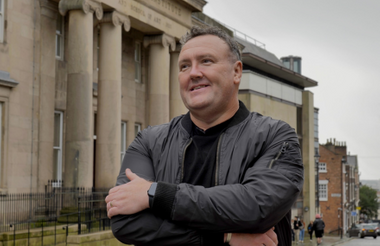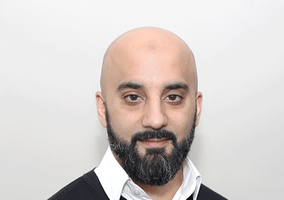Stu Otten is head of criminal justice services at modern slavery charity Causeway, but as a young person he felt he “didn’t belong in society” and became involved in dealing drugs.
Otten says it is “massively important” for charities to involve staff with lived experience in their service delivery, which can aid their ability to connect with beneficiaries.
He says trustees also “need to be in the same thinking space” but warns against charities hiring people simply to tick a box.
‘It was so difficult to get out of that’
Otten grew up in Liverpool in the 1980s where there was an epidemic of heroin – “it was flooding the city”.
One of his first memories of playing with friends at around five or six years old, is that they would find objects which they later learnt were needles.
The estate on which Otten grew up was called Dodge City “because it was basically where all the criminals went to avoid police, because police would not go onto the estate, it had that reputation”.
After experiencing bullying as a child, Otten felt he had to conform to the macho culture around him. His parents spotted his anger and he began attending a kickboxing class in an attempt to control his outbursts.
However, there he saw older boys with nice cars and designer brands, and Otten decided he wanted to be just like them. He got a job as a doorman and began dealing drugs.
“I would probably call that grooming in that they saw in me that I had the thought process that I didn’t care who the person was, how big they were, what they were carrying, for me it was always a question about: ‘Am I prepared to take more steps than you?’ I did have that mentality where I would escalate.
“There were lots and lots of acts of violence that just perpetuated themselves and got worse and worse.”
In his twenties, things intensified for Otten and he hit a mental health crisis point – “I was constantly looking over my shoulder, it got so low and so desperate”.
But after a particularly violent altercation, Otten realised he “had to choose a moment to change or I would be dead or go to prison”.
The moment of change was like “a religious experience”. Otten saw a sign for church and heard an audible voice – “I imagine that it probably was some kind of drug-induced psychosis. I’d taken a lot of ecstasy, but I heard a voice that said: ‘You should change and you need to go to church.’”
The feeling of belonging in a new community helped Otten, who says often people who have a history of drug and alcohol abuse, the common thread is about identity and belonging. Nonetheless, “it was so difficult to get out of that”.
At 23, Otten began working in a care home and then attended Liverpool John Moores University to study social work, before he began working at Causeway in 2015.
‘I always said I would never work for the charity sector’
Otten had not previously considered he would work in the charity sector, and says this was “ignorance to some extent”.
“It’s a funny one because I always said I would never work for the charity sector,” Otten reflects, but “I wanted to explore something different”.
“I didn’t really see the benefit and actually how much charities put into this country – if we didn’t have charities, the country just wouldn’t run.
“When I started working for the Causeway it gave me the ability to listen to other people’s stories. I’ve been through a lot myself, and I understood some of the complexities of where people have come from because of some of the trauma I faced.”
Otten says Causeway “have been absolutely incredible with me” and the fact that they’ve trusted him has been key.
“One of the key elements of what we do understand at Causeway is that crime is a cycle, it starts somewhere and it ends somewhere.
“We have to address both the victim and perpetrator because otherwise we are not getting anywhere. I have a little phrase from myself – one less perpetrator is one less victim.”
‘No excuse for organisations to say it’s just too complex’
For some organisations, Otten says it “feels very complex” to employ somebody with a background of criminality, but actually “I don’t think there’s an excuse for organisations to say ‘it’s just too complex’ because there are ways around it”.
“Certainly, organisations that are serving people who are experiencing issues in society, whatever that might be, then lived experience is massively important.”
One key area in which lived experience helps the charity with, is “connectivity”, says Otten.
“What it does is automatically as soon as you speak to somebody who you feel understands where you’ve been or where you are, there’s an instant level of trust and connection.”
Otten says it is “powerful when you take that story and you put it into the perspective of somebody else who’s also experiencing that and you’re able to say ‘hey look there is a way through, there is a way forward’ and help that person”.
“I made stupid decisions, and I was responsible for those stupid decisions,” he says.
“My opportunity to use my journey has been very much inspired by my organisation but also managed extremely well by my organisation, and I think there has to be an intentionality to do that.
“I believe charities have to want to hear the voice of people who have lived experience in order to change and shape and grow as an organisation. And that has to be deeply entrenched.
“Your trustees need to be in the same thinking space because obviously it has to come down from your governance structures.”
Causeway has somebody with experience of modern slavery on its board, and plans to one day have somebody with experience of criminality as a trustee.
“They need to be represented at that highest level to be able to put that much weight throughout the organisation and so I would encourage charities where possible that it makes absolute sense to have someone at every level of your teams,” says Otten.
“There are so many aspects of the organisation, that there’s opportunities right across the board for someone to have an influence on an area and even the smallest influence still makes a difference.”
However, he says that charities should avoid being tokenistic when hiring people with lived experience “because you’re going to fail them”.
Otten shared his story as part of Causeway’s Breaking Cycles: Building Lives campaign, which he says is about “giving people an opportunity to move forward with their futures and to have a meaningful place in society”.
Related Articles












